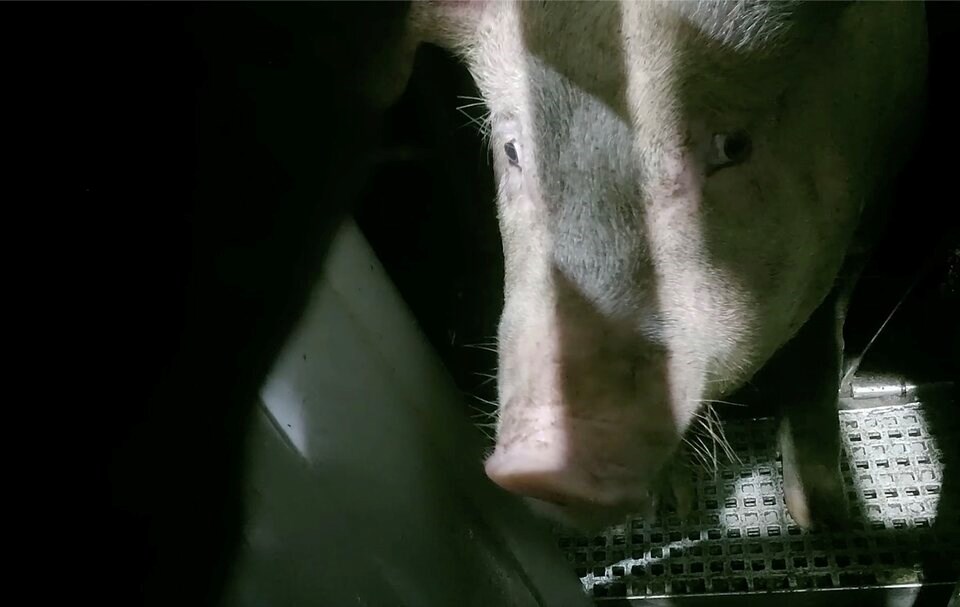B.C. authorities overseeing animal welfare and agriculture have launched probes into a Chilliwack slaughterhouse after anonymous video surfaced showing what one animal rights group described as potentially “illegal behaviour.”
Workers at the Johnston Packers Ltd. facility appeared to illegally mutilate and injure still conscious pigs on their way to be slaughtered, alleges a legal complaint filed by the advocacy group Animal Justice on Dec. 3.
The complaint requests the Ministry of Agriculture and Food, the BC Society for the Prevention of Cruelty to Animals (BC SPCA), and the Canadian Food Inspection Agency (CFIA) investigate the provincially licensed facility for potential breaches of a federal laws and regulations surrounding food safety and animal health. It also called on provincial authorities to look into whether the company had violated laws meant to prevent cruelty to animals.
Animal Justice executive director Camille Labchuk said the footage represents the first time operations inside a hog slaughterhouse have been caught by a hidden video in Canada.
“Imagine the horror of being slaughtered while fully conscious, being viscerally aware of everything that is happening in these terrifying final moments of your life,” said Labchuk in a statement.
Johnston distributes its pork products to butchers and grocers across the Lower Mainland. The company advertises itself as a providing “old-fashioned service” and “high quality products” that adhere to the philosophy “happy animals = higher quality.” The company did not respond to multiple calls and emails by publication time.
Marcie Moriarty, the BC SPCA’s chief of prevention and outreach services, confirmed the group had opened an investigation into whether the company violated the Prevention of Cruelty to Animals Act.
“Review of the footage and retention of any potential experts to review can be a lengthy process,” said Moriarty. “As with any open investigation, we are limited in what information can be publicly provided at this time.”
A spokesperson for the ministry said it would also review “hours of video” it received before determining what steps to take next. CFIA did not immediately confirm whether it had launched its own investigation.
Video shows evidence of botched slaughter, claims group
Leaked video claimed to have been shot over the summer shows pigs struggling to escape a chute as workers prod them with stun devices. On the killing floor, workers appear to botch attempts to stun the pigs and slit their throats multiple times while still conscious.
In another scene, Animal Justice claims the video shows pigs getting loaded into the scalding machine while still showing “signs of consciousness.” One worker cuts off a pig’s ear and throws it at another worker, alleges the complaint.
Toronto-based veterinarian Izzy Hirji is cited in the legal complaint claiming he saw “numerous” animal welfare problems, including what appeared to be poor training in animal handling, improper use of the stunner, and animals being sliced while showing signs of consciousness.
In a version of the footage edited by Animal Justice, Hirji says the rhythmic movements of the pigs could be spasms due to stunning or death, and do not indicate consciousness.
However, in other instances, Hirji is quoted saying the pigs are seen blinking and moving in response to touch stimuli or the cut of a knife — patterns that he says don’t match the rest of the body’s rhythmic contractions due to stunning.
Footage requires forensic audit
Victoria Shroff, K.C., a practicing lawyer and professor teaching animal law at the University of British Columbia and Capilano University, said it's important to note that so far, nothing has been proven in court.
What is clear, Shroff said, is anybody watching this video is going to see “disturbing and horrifying images of animals being allegedly harmed.”
“There’s no other way to put it. It just looks like some sort of horror show,” she said.
The lawyer said any investigation will look into who shot the video, when and how it was obtained, and whether what’s shown is actually real.
“What is depicted here is troubling footage… It’s upsetting. It’s horrific. Is it illegal? Is it even real footage?” Shroff said. “We’re in an age of [artificial intelligence]. We’re in an age where people manipulate footage.”
“It’s just something you have to consider. It requires a forensic analysis.”
Claims raise bigger questions over farm transparency, says lawyer
The Animal Justice complaint also points to dangerous working conditions. The video appears to show a worker shocked by the stun machine; another is almost hit by a pig strung up by its feet while still alive — one of many instances of conscious pigs falling to the floor.
“Animals are not provided with ‘sufficient space’ to prevent suffering or injury, with live animals often stacked on top of one another in a small room or chute, often trying to escape and exhibiting clear signs of distress,” the complaint alleges.
If the footage proves to be accurate, Shroff said investigators will then look to establish whether there were other witnesses. Ultimately, the lawyer said the allegations could be pursued under several federal and provincial laws, including the Criminal Code.
Prosecution of the case, however, could be difficult if investigators are unable to track the source of the video, she added.
Whether or not the investigation leads to charges, Shroff said the footage raises bigger questions about oversight in Canada’s farming industry.
As a leading legal voice on the country's animal welfare law, in the past, Shroff has recommended installing closed-circuit television cameras, or CCTV, in slaughterhouses to monitor worker safety and treatment of animals “behind closed barn doors.” But that advice was ignored, leaving the public without adequate mechanisms for transparency, she said.
“People want to know how their animals are raised — whether they’re meat eaters or not,” Shroff said. “People want to know what ends up on their plate is not a result of abject cruelty.”





